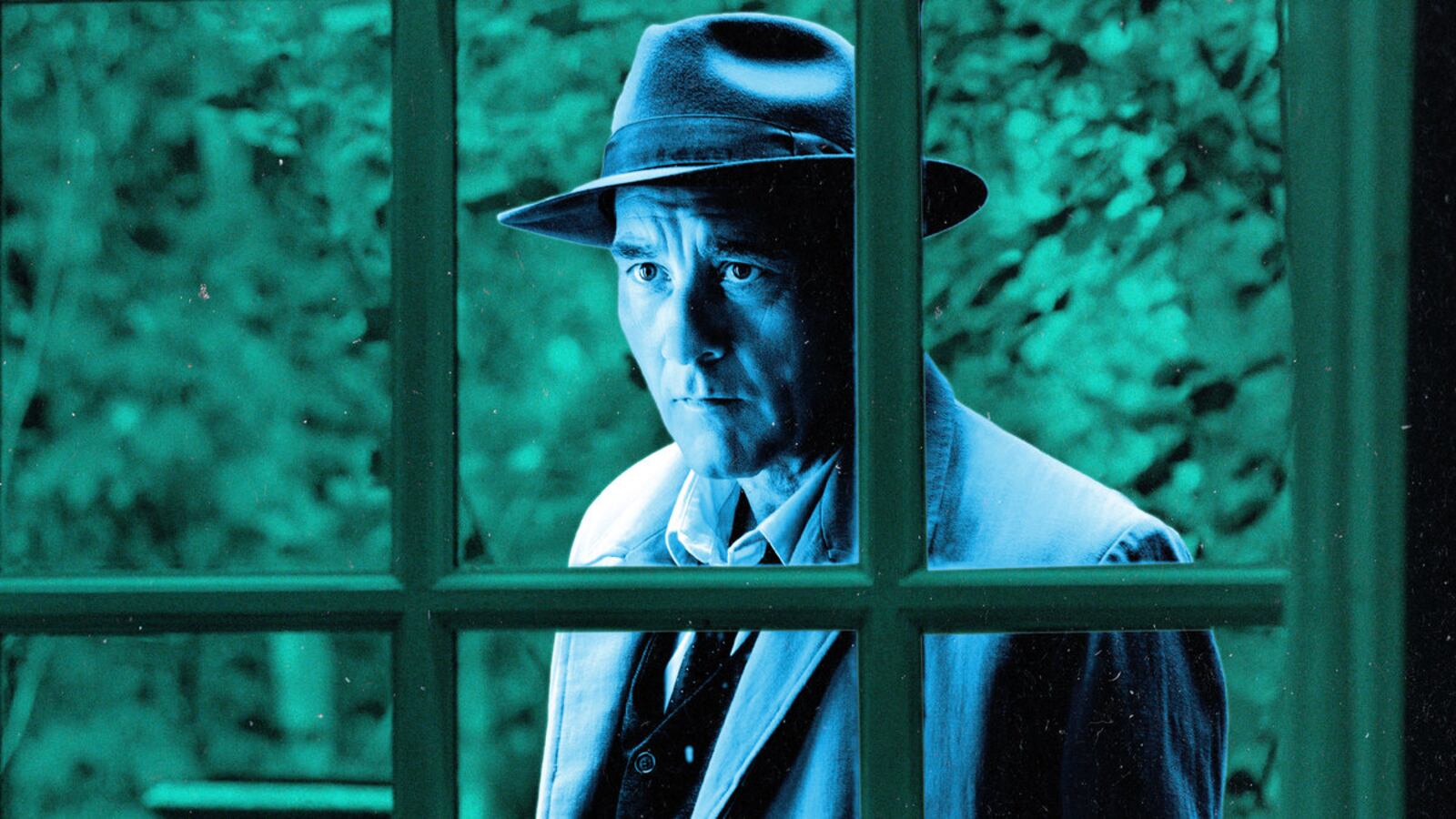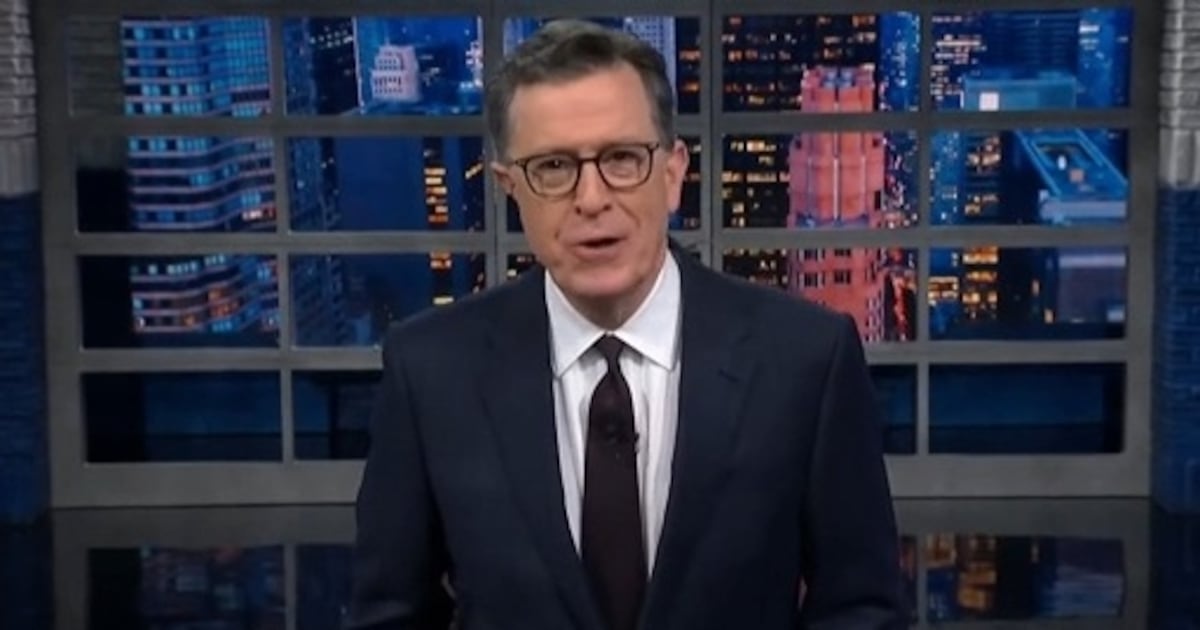Ever since he burst onto the international scene with 1998’s Croupier, Clive Owen has proved himself to be the embodiment of suave, confident, laid-back cool. He once again exudes those qualities to compelling ends in Monsieur Spade, a six-episode affair from The Queen’s Gambit mastermind Scott Frank and Oz creator Tom Fontana, in which he stars as an older version of Dashiell Hammett’s legendary private investigator Sam Spade.
Donning the character’s trademark hat and coat, a cigarette casually perched between his lips—this despite a recent medical diagnosis that suggests Spade do otherwise—the 59-year-old actor slips comfortably into the role made iconic by Humphrey Bogart in 1941’s The Maltese Falcon. Navigating a mystery involving a missing child, a collection of murdered nuns, and all sorts of shady characters in the idyllic French countryside town of Bozouls, Owen’s sleuth is the poised if weary centerpiece of AMC+’s limited series, and another in a long line of parts that take great advantage of the headliner’s unruffled charisma.
As Croupier did 25 years earlier, Monsieur Spade is a crime saga that suggests Owen would have made a perfect 007—a casting idea that’s long been a favorite of Bond aficionados. While that opportunity has now seemingly passed the English actor by, Frank and Fontana’s small-screen effort gives him an ideal chance to show off his magnetic charm, and coming on the heels of his wildly different turn as a tech billionaire in FX’s whodunit Murder at the End of the World, it demonstrates that television suits him like a glove. Moreover, it’s the vehicle for another standout performance in a career full of them, be it his work in 2004’s Closer (for which he received a Best Supporting Actor Oscar nomination), 2007’s Children of Men, or 2014-2015’s The Knick, which remains one of the past decade’s finest TV series. Ahead of Monsieur Spade’s Jan. 14 premiere, we chatted with Owen about following in Bogie’s footsteps, showing some on-screen skin, and his dislike of doing the same thing twice.
What’s the trick to playing composed, self-possessed cool—which is something you first exhibited in Croupier, and is certainly on display in Monsieur Spade?
I don’t think it’s a wrong thing to put those two films together, really. Croupier was the film that probably had the biggest impact on my career in terms of opening things up in America and for my film career. And they are similar worlds. I happen to be a huge Bogart fan, so when Scott came to me and said I want to do Sam Spade, I was like, oh my god, I have a Maltese Falcon poster on my wall—this is heaven to me.

Clive Owen in Monsieur Spade
AMCWhat I think you need in order to do it, and I had it in Croupier and I definitely had it in this, is really good writing to be able to keep that restraint. If the writing is there for you, you trust that and you feel you don’t have to over-explain things. You keep things very, very tight. It’s the kind of acting I love to watch. It’s why I love Bogart. You need the good writing to be able to do that well.
When tackling a role like this, is it difficult (or necessary) to put Bogart out of your mind?
I didn’t want to get Bogart out of my mind. What I did do is I drowned in Bogart. Then I had a meet with Scott months before shooting. I said look, don’t freak out about this, but I’m going to base the voice on Bogart. I’m not going to do a bad impersonation of him; I’m just listening to him a lot, his cadences and rhythms. Scott said, that is perfect, because as I wrote this, every time I wrote a line, I had to hear Bogart saying it before I could move on. So we were both together in that [laughs].
It’s not like I’m trying to do Bogart. I just think that his rhythm and intonation and speed… the one thing you think about with Bogart is that he’s laconic and cool. But actually, when you really look at it, he talks fast. And he often does big strings of dialogue very nimbly and quickly, and it looks totally effortless. If anything, that for me was the biggest challenge. Scott wrote similarly. There were some very long dialogue scenes, and for me, it was about trying to get that ease, so you ripped through it, you let that dialogue sing, you didn’t overmilk it or drag it out, you did it speedily. So in some ways, I wanted Bogart with me through it in my head.
How much did you have to work on Spade’s particular 1950s-’60s American accent—especially when you had to use it while speaking French?
The French was a big thing. I don’t speak French, and that was hard for me, I have to be honest. I literally now understand that when an actor plays a part in another language, it is an extraordinary achievement. I didn’t have to speak much, and I started to learn French and realized that I didn’t have the time, and I wasn’t doing it to pass an exam, so I started to learn it phonetically, and I had a great dialogue coach. On the one hand, I’m doing these super nimble, fast, long dialogue scenes in American, and trying to get that thing. But the small bits of French were in some ways even more taxing for me, because I felt less in touch with it, really, because I didn’t speak any French prior to it. It felt hard. So I’ve really realized that when actors do that—doing a part in another language—it’s hugely impressive.

Clive Owen in Monsieur Spade
AMCIs some of this process—of becoming Spade, in the shadow of Bogart—made easier by the fact that you’re working from an original story, rather than an existing Dashiell Hammett novel?
There is that, but there’s no question that both Scott and Tom were huge admirers of the original source material, like I was. The reason for doing it is that we love Dashiell Hammett and Sam Spade. We love The Maltese Falcon and that character. I don’t really treat it as a burden that you have to carry; I treat it as a joy. I went back and watched all those old Bogart films, and I lifted his dialogue from two or three movies, only his dialogue, and had that as an audio thing in my ears every day, to get me into the vibe and the tone. I didn’t approach it as, oh my gosh, I’m taking on something here as a burden. I took it as, what a great way to drown in Bogart for a little while!
Speaking of self-possession, Monsieur Spade has you strip down completely nude a few times.
[laughs] Yeah, I gave a Scott a hard time. I said, look, you make me take my clothes off to swim, you don’t let me wear the hat enough, I have no guns—what is this? What are you doing to me? I want to play Sam Spade! [laughs]
But yeah, he told me about that very early on, that [the nudity] was going to be a recurring theme. I just knew I had to get to the gym.
He also strips you of smoking for a lot of the show!
Oh my gosh, I know! We had a running joke. I kept saying, I’m not actually playing Sam Spade—I’m going to go off and do another movie where I properly play him, because you’ve just duped me! [laughs]
How did Monsieur Spade first come about?
I got a call that they wanted to talk to me. They pitched me that they had the idea of taking Sam Spade to early ’60s France—the beginnings of that, and the beginnings of some stories. They called me to say, is that something you’d be interested in? I said yes, in a heartbeat. I sent them a picture of my Maltese Falcon poster and said, you’ve come to the right guy, I’d love to do this.
You've done a lot of TV during the past few years. Is that where the most opportunities now exist?
Sure. It’s changed massively from when I was young. I started in TV and then went into movies, and there are very few actors now who aren’t doing TV. When you get the writing and directing caliber of someone like Scott Frank doing it, and exploring something like this over six hours… there were times during the shooting of this where there was no place I’d rather be as an actor. This was, for me, as good as it gets, working with someone that smart, with great dialogue, playing a character like that. Whatever it is, TV or film, I always say that if you’ve got great writing and a really good director, that’s where you want to be.
A lot of your recent small-screen work—be it in American Crime Story, Lisey’s Story, Murder at the End of the World, this—are limited series or, as with Cinemax’s The Knick, self-contained stories. Do you prefer that format, where you know the beginning and end of a character and narrative?
There is very often an element of that in all the things, actually—except this one, because I’d willingly do more of these just because I love the genre and the character so much. You mention The Knick, and Steven [Soderbergh] told me the two-season run of that, and how Dr. Thackery was going to leave the series, so I went into that knowing that that was as far as it was going to go for me.
I have to be honest, throughout my career, I do find that doing the same thing over and over again is not that attractive. If I did plays, I would do them for the initial run and then I’d want to leave and go onto other things. Similarly, I wouldn’t want to do something where it just ran and ran because what happens is, you overexpose yourself—you’re showing the same thing over and over again. The joy of acting for me is that you play all these different parts. That’s the fun of acting, and if you’re just playing the same part, year after year, it becomes something else.

Clive Owen in Monsieur Spade
AMCThis show is obviously far removed from Murder at the End of the World. Do you actively seek out that sort of variety?
I think it’s one thing I’ve always thought. If you just go and look at the history of the parts I’ve played, it’s the thing that, in some ways, I’m most proud of and most interested in: that it jumps around all over the place. I’ve always been attracted to doing something, and then I go, right, and I do something else. I started off in the theater, and that’s why you get into the theater—you want to play lots of different parts. Similarly, I think the most exciting thing to be is to be scared and to be trying something new. That’s the best place to be.
For years after Croupier, you were dogged by James Bond rumors. Was avoiding that part, and most other franchises, driven by a disinterest in getting locked into one role and genre?
Yes, I think that’s a very good point. The thing about this particular show, because it’s a genre I love so much and because I rate Scott Frank so highly as both a director and writer, we’re already talking about the possibility of doing more. That’s something with this one that I wouldn’t hesitate to do, just because there were times when I was shooting this series and I was like, this is where I want to be. I’m working really hard, I’m trying to live up to really great dialogue with a director I totally trust, and that’s where you want to be as an actor.
The show certainly leaves the door open for future installments.
The beauty of something like this is, once you’ve set him up, you can take him anywhere. The options are really exciting and open. We’re not set up in a world where we’d have to keep repeating that world; we can throw Spade anywhere and go, how would you cope if he was in this situation or in this environment? So the potential to do more is much more interesting than if it was something that was really locked in.
Is there a particular place you’d like to see him go?
I wouldn’t mind going back to San Francisco!






